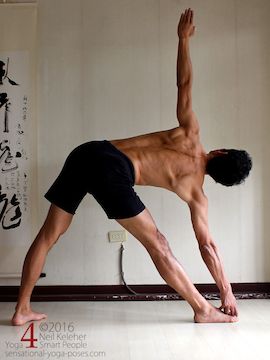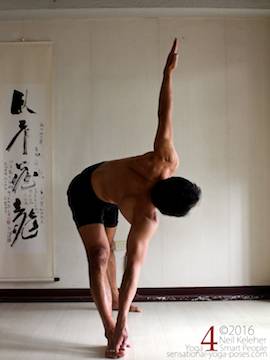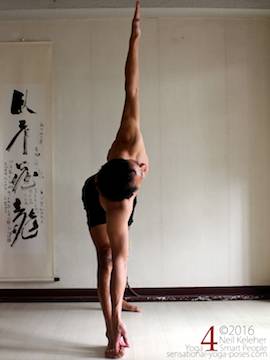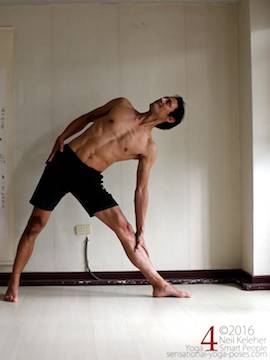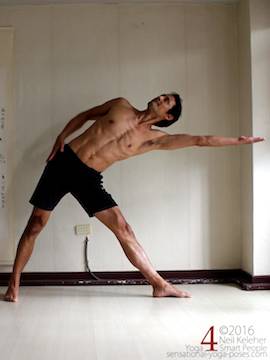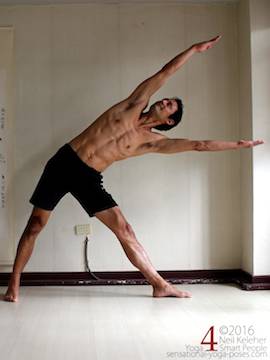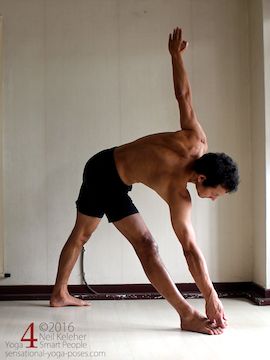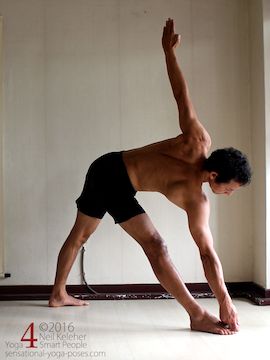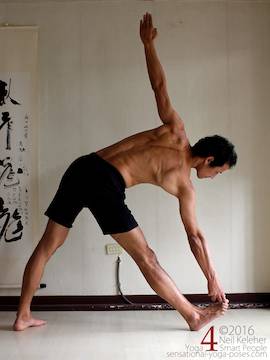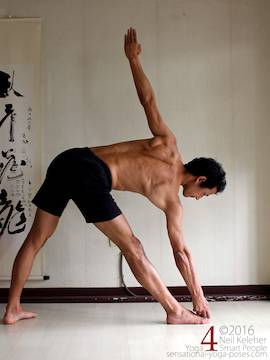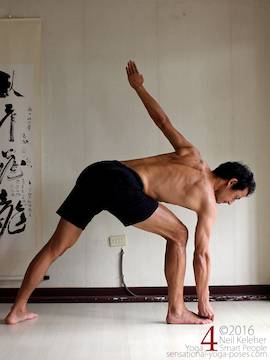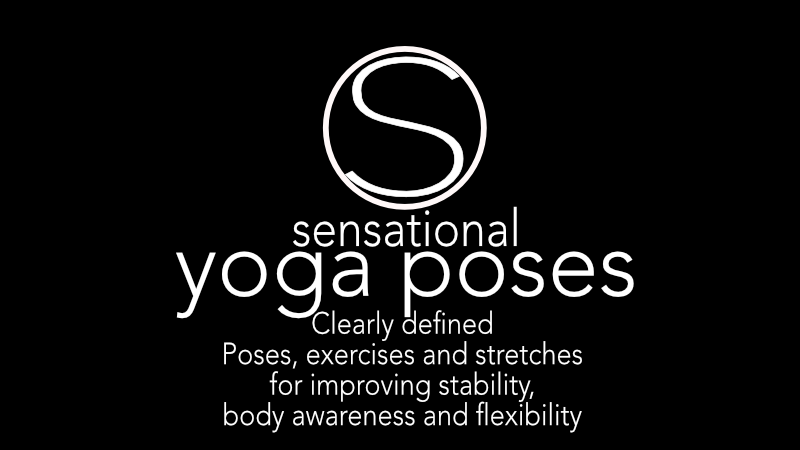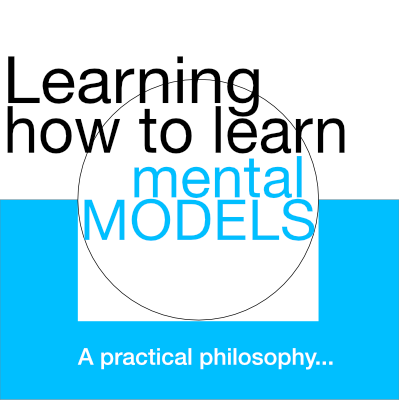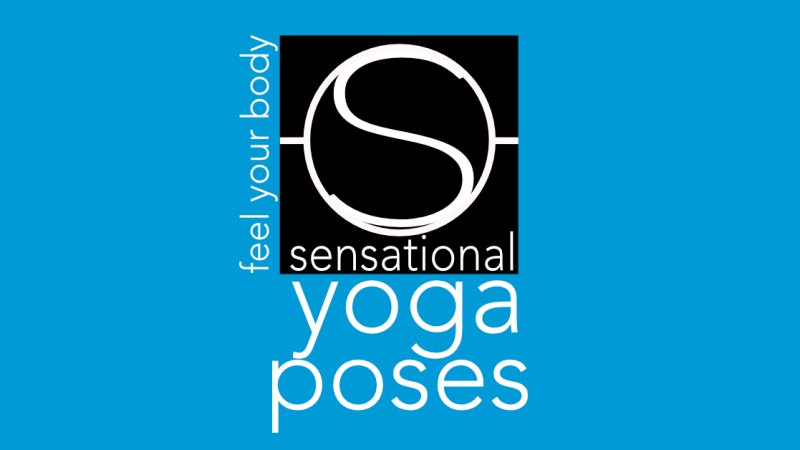Utthita Trikonasana
Using Triangle Pose to Strengthen the Side of the Body
The two traditional ways to do utthita trikonasana (triangle yoga pose) are to either grab on to the big toe in this triangle shaped yoga pose or to rest the bottom hand on the floor. In either case the legs are about a legs length apart with one foot turned in slightly and the other foot (the "reference" foot) turned out 90 degrees.
In both versions of this yoga pose the torso is leaned over the front leg.
One advantage of the "big toe grabbing" version is that it enourages you do be a bit more active in the pose.
Rather than using your arm to help support your body, in the big toe version you can focus on using your leg and waist muscles to help support the weight of your upper body. They'll get stronger as a result.
Using a Strap
In Ashtanga yoga the usual method of doing utthita trikonasana is to grab the toe. This can be problematic if you haven't got the necessary flexibility but want to grab the toe and keep your torso over your leg.
An option is to hook a strap around the foot and grab on to that. Using a strap, you could give the strap a little bit of slack, then pull your torso up to take out the slack. Then relax and let your torso sink down a little. As you do so, reach a little further down the strap then repeat, gradually moving your hand closer to your foot each time.
Why Grab the Big Toe?
Now why grab the toe when doing utthita trikonasana in the first place? One reason is that you can push down with the toe while pulling up on the arm using the legs and waist. This can actually be a way to strengthen the fingers, the arm, the waist, the si joint, the toe, the foot and the back of the leg. The foot presses down and the torso and arm pull up. So then, how crucial is it that you keep your torso over your leg?
Is It Okay to Lean Forwards?
If your torso is over your leg and your pelvis and ribcage facing "the front", then pulling up on the torso in utthita trikonasana will work work on the waist and lower back. So if you bend forwards to grab the toe and then pull up while staying leaned forwards there can still be some strengthening benefits. You can still resist with the toe while pulling upwards with the body. The effect will be slightly different but you can still be strengthening the body.
Not Grabbing the Toe
Another option for utthita trikonasana is to not grab the toe and hold the body up against gravity. You can then keep your torso aligned over your reference leg.
To increase the strengthening effect you can reach your arms past your head.
An easy way to enter this variation of the utthita trikonasana is to start with your hand resting on your leg. Brace one or both legs so that you can easily lift the hand while keeping your torso over your leg. From there reach one arm past the head. Then when you are ready reach the other arm. If you find it is too much you can reach the arms while inhaling and support your body by resting your hand on your leg while exhaling.
To Tuck or Not to Tuck the Tailbone
Should your tailbone be tucked when doing utthita trikonasana, or should it be lifted?
If, while standing, you lift your tailbone, the result is an increased lumbar lordosis and the pelvis tilted forwards. Doing the opposite results in a decreased or flattened lumbar lordosis and the pelvis tilted rearwards.
I like to play with both options.
If you lift the tailbone your lumbar lordosis will increase, particularly if you work at keeping your ribcage over your leg. Meanwhile dropping the tailbone decreases or flattens the lumbar lordosis. Is one better than the other? I'd suggest that both of these are options.
For myself, the tailbone lifted position with the lower back bent slightly backwards feels better, but note, if you play with the extremes, and move between them you can feel and find for yourself the position that feels just right. Part of the reason that I know it feels right is because I've practiced moving smoothly between both extremes. I suggest you do the same.
Gripping and GrabbingOptions
If you can grab the toe and you find that your hand gets tired it may be time to experiment with wrist position. You may find that it is easier to keep a grip if you bend your wrist, so that the muscle of your palm and fingers have more room to contract.
As for grabbing the toe, you can try lifting the forefoot to make grabbing easier. Then work at pressing the forefoot down (below).
Or you can try starting with the knee bent. Move your torso close to your thigh and grab the toe. Pull your torso up while resisting with the big toe, then straighten the knee.
More options
For a few more options, in particular for how to use your legs, read the very similiar article with a different name: triangle yoga pose
Published: 2016 02 22
